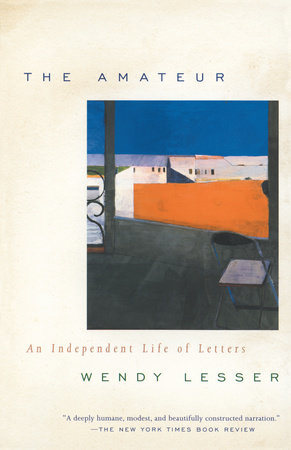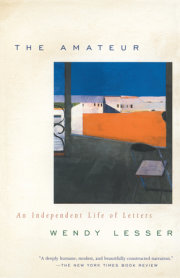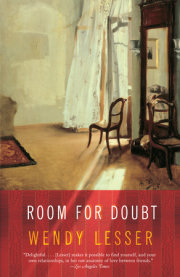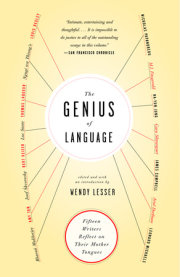The Conversion
This is not to say that I am entirely reformed. I am still one of the stubbornest people I know. My first response to any suggestion or criticism or recommendation is generally to say no; only later does it occur to me that it might have been a good idea. Change is always difficult for me, and resistance is at the core of my personality.
I resisted e-mail for at least two or three years. Many of my Berkeley friends are academics, so they got it automatically as part of their jobs and then annoyingly sang its praises. "It replaces long-distance phone calls!" "You can dig up old recipes from libraries across the Midwest!" "It allows you to communicate instantaneously with colleagues from South Africa!" None of these seemed like things I particularly wanted to do. Moreover, I had strong if somewhat irrational reasons for resisting. I did not want my computer talking on the phone to anyone else's computer, because who knew what could happen once you opened up those lines? I wasn't just worried about viruses, though those were indeed a concern; but how could you be sure that someone wouldn't sneak through the e-mail door and thereby penetrate your hard disk, stealing or at any rate messing up your closely held documents? I preferred to keep my computer chaste and self-contained, aloof from all potential communicants.
And then, I didn't see the point of getting those unreadable little messages that seemed to go on forever, with little or no punctuation. To judge by the e-mail I had read in newspapers and magazines (the kind that was always reproduced to show how fun and liberating this new mode of communication was), these emissions were somewhere below the level of the worst unsolicited manuscripts I receive in the course of editing a literary magazine. Why should I want to read more of the stuff, especially on a barely legible computer screen? What was the good of a technological form that erased the boundary between intimate friends and total strangers, reducing everyone to a digital printout? Where was handwriting in all this? Where was
personal style?
I should interrupt my screed to say that I am not a complete antitechnologist. I watch more television than just about anyone I know, and believe that
Hill Street Blues and
NYPD Blue are among the substantial artistic achievements of late-twentieth-century America. I use the latest (well, the second-latest) desktop publishing equipment to put out my magazine, and rely on a rather complex database software to organize its subscriber list. I adore the fax machine and have long considered it the single greatest invention since the telephone--the fax machine, after all, respects and transmits handwriting, just as the telephone conveys the nuances of the individual voice. I am not, that is, a hermit. I constantly employ and enjoy electronic transmissions of many sorts, and I do not feel that they in any way sap my capacity to be an Emersonian individual. On the contrary, they enhance it: without all my little machines, I could not make a living as a self-employed, self-designated arbiter of cultural taste. In Emerson's time you had to inherit a comfortable income if you wished to subsist as a man of letters; in our day technology can substitute for and even generate the freeing effects of wealth.
But for some reason this dashing perspective, this resolutely cheerful optimism about mechanical progress, did not make a dent in my fear of e-mail. From the viewpoint of one who has now crossed the great divide, I can see that my phobia stemmed in part from a category error. That is, I thought that "e-mail" and "the Internet" were identical: I believed that in order to communicate with my friends and colleagues I would have to place myself squarely in front of all the oncoming lanes of traffic in the Information Superhighway. Worse: I was persuaded that those snippets of generic e-mail clipped from the bulletin boards of the Internet represented what my own friends would sound like if I had to talk to them by computer. I wrongly supposed that the machine controlled its own content, that the medium (as we used to say,
pace McLuhan, in the Sixties) would be the message.
Why I should have believed Marshall McLuhan in this respect when I had long since discarded his views on television is a question that perhaps requires a cultural psychotherapist to answer. (I don't know that there is such a thing as a cultural psychotherapist, but since I have recently learned of something called "ecopsychology"--which is designed to help us bond with Mother Earth--I assume there are no limits.) For some reason, fear makes us believe in false prophets, the more apocalyptic the better. Clinging to the printed pages of my old-fashioned literary quarterly and my beloved cloth- and paperbound books, I thought that e-mail spelled the end of reading as I knew it. After all, you couldn't do it in the bathtub.
I still wouldn't want to read a novel or even a ten-page story on e-mail, and faced with that little message screen, I probably couldn't compose an essay worth printing. But for daily correspondence, electronic mail has become my essential instrument. Like all tools, it is more than just a simple replacement of the previous technology--it acts on you as well as you on it, and it acts in ways you can't always predict. In effect, e-mail has restored the personal letter to my life.
If you are like me, you went through a phase when personal letters occupied a central place in your existence. You were probably in your late teens or early twenties. Possibly you were living away from home for the first time, or perhaps you had just embarked on your first long-term (and long-distance) love affair, or maybe you were traveling alone through Europe, or all of the above. The mail became your lifeline, and you honored it accordingly. You poured everything into your letters--the engaging details of daily existence, the special sights, the serious emotions, the witty observations--to such an extent that even journal-keeping, by comparison, seemed onerous and redundant. You tailored each letter to the personality of the recipient, delightedly imagining the eventual response to the in-jokes of a shared history. You received as good as you gave, and each day's mail delivery marked an emotional high or low point. And then, at some stage, you grew out of all this, and household bills, business letters, magazines, and fundraising pleas came to fill your mailbox.
Just as personal letters define a phase in an individual's life, so do they also define a period in Western history. I didn't realize this until I read P. N. Furbank's review of the
Oxford Book of Letters, wherein he remarks "how deprived the ancient world was, not having discovered the secret of personal letters--long, spontaneous, chatty letters, as funny as they can be made but not always just funny, and coming nice and often--the sort of letters you might have got if you had known Henry James or Bernard Shaw or Philip Larkin. You would have been expected to answer them, and that would have been marvelous too, at least for oneself. It would be like enjoying a second life." Exactly. And, as Furbank goes on to say, "The ancients knew nothing of this. With what leaden spirits one would have received a letter from Cicero! One may hazard that this best kind of letter-writing began in the eighteenth century and really came into its own in the nineteenth." Not coincidentally, this was just when the postal system was reaching a pinnacle of service, in terms of frequency and reliability.
For one of the keys to the pleasure of letters lies in that half-buried little phrase, "and coming nice and often." In London, where P. N. Furbank lives, mail is still delivered twice a day, and a letter posted first class will reach its destination anywhere in the United Kingdom by the next day. It is still possible to keep up a satisfying personal correspondence under such circumstances. For the rest of the world, however, mail is generally too slow to gratify the needs of the moment. You might choose to rely on the stamp and envelope on special occasions, or for particularly delicate communications, or if (like a young person in her teens or twenties) you live on a very limited budget; but when you have something important to say, you're much more likely to pick up the telephone.
The crisis in my attitude toward e-mail occurred when I realized that I would no longer be able to afford the telephone. I was about to leave America for four months, and to indulge in long-distance calling from England would be ruinously expensive. Nor could I tolerate waiting the two weeks it would take for the round-trip communication by post. It was e-mail or nothing.
One problem with e-mail, though, is that it takes two actively willing participants. Anyone in the modern world can receive a postal letter, but only those with an e-mail hookup can receive e-mail. So I had to get my near and dear to join up at the same time I did. Among those I had to persuade was a writer in New York, a friend of over twenty years' standing on whom I normally lavish at least one long-distance phone call a day.
It always stops the conversation dead when I tell people, as I occasionally do, that I talk to Arthur every day on the phone. If my husband is present, he may get looks that imply, "What's the story here?" Or sometimes I get looks that say, "Aren't you a little old to have a 'best friend'?" But the truth is, I'm not: I need to have someone there at the other end of the phone line who can sympathetically but analytically respond to all the little exuberances and travails of my daily life. And so, apparently, does Arthur--either that or he's just humoring me. It's not easy to explain our connection. Some people might say that the pleasure lies in vicariously experiencing an alternate life (the straight California woman who writes for marginal literary publications versus the gay New York man who works in the world of glossy commercial journalism), but that feels too schematic. I would say that, despite the obvious differences in our personalities (I am over-eager and intense, whereas Arthur routinely, and correctly, describes himself as "phlegmatic"), we share an essential element in our character; but that is no explanation, simply a circularly-arrived-at conclusion. Perhaps it's just that we know each other very intimately--as well we should, after decades of daily phone calls.
Since Arthur is even more of a technophobe than I am, persuading him to adopt e-mail was no easy task.
"I feel very resistant to the idea," he explained.
"I know, I know," I said. "I've already been resistant for three years, so can't we take it as done?"
Finally, I just cheated. I ordered
his CompuServe introductory package when I ordered my own, knowing that when the user-friendly software slipped through his mail slot, he would be unable to resist trying it on. (Or, to put it more truthfully: I planned to make life miserable for him via telephone until he got around to applying his e-mail diskettes.)
It was slow to catch on. At first Arthur and I used e-mail mainly as a toy, in between the more substantial communication of our transcontinental phone calls, and most of our electronic conversation was metaconversation, in that it dealt with the ins and outs of using e-mail. But when I left California on a Wednesday night, arrived in London on the Thursday morning, hooked up my computer, received Arthur's welcoming message, and instantly e-mailed back--well, that was a revelation for both of us. Soon we were up to three or even four exchanges a day. The five-hour time difference meant nothing: he could post a note before he went to sleep, and I would receive it when I woke up the next day. And what I discovered, to my enormous pleasure, was that the electronic mode did not wash out his characteristic tones. On the contrary, he sounded in his virtual incarnation exactly as he did in real life: wry, observant, dryly affectionate, subtle, and sharp. Personal style, it turned out, did not get blotted out by the machine. In some ways it was even enhanced, with new opportunities for humorous self-expression and literary allusion afforded by the title spaces in our messages. "Internettled," his title bar announced when he had been fiddling all day to make the machine do something new. "Later the Same Day," I called one of my frequent messages, echoing Grace Paley. And it was inevitable, given the technology, that we would soon feel inspired to use E. M. Forster's "Only connect."
Even in our differing responses to the availability of e-mail, Arthur and I were faithful to our respective personalities. Something of a self-styled loner, he built up a tiny, highly selective list of e-mail addresses and mailed only to those two or three people. (His willful resistance to technological self-education may have had something to do with this. "How do you communicate with those outside our parish?" he once complained, stumped by the difficulty of crossing over from CompuServe to America Online or Prodigy. )
I, on the other hand, verged on epistolary promiscuity. Within my first week online in California, I had mailed to a number of my Berkeley pals, a long-lost classmate in Tasmania, three Londoners, my husband at his work address, my stepson at college, my father, my sister, a good friend who had temporarily moved to St. Louis, and my exercise teacher. I became an e-mail maniac, checking in every hour or so and collapsing with disappointment if I got the empty-mailbox beep. I found myself waxing expansive onscreen, chatting on about virtually nothing. I was responding, I now think, to the special enticements of the form's mixed nature--at once private and public, solitary and communal, so that it seems to combine the two oldest types of American writing, the diary and the sermon. With e-mail, you begin with the former, alone at your desk, and end (if you use your "multiple send" button) with the latter, broadcasting to the whole congregation.
One of the first responses I got from old e-mail hands, when I contacted them with my newly acquired address, was scorn at the impersonal nature of my mailing moniker. All of my friends, it appeared, had managed to craft idiosyncratic, sometimes poetic, always memorable labels for themselves. Using the loose conventions set up by most e-mail providers, they had come up with word combinations that were nearly as distinctive as their own names (and that often incorporated those names into the address). But CompuServe allowed for no such creativity: we were simply allocated a number. "Your address sounds like something from the Planet Zog," one of my correspondents wrote. Another mocked me for my long resistance to e-mail. "This is just the kind of address I would expect a confirmed Luddite to get," he noted. "Those who resist the machine are doomed to be punished by it."
Whatever form it takes, your e-mail address becomes a part of your permanent identity in a way that no mere phone number can. For one thing, you can't hide it. You can make an obscene phone call from an anonymous number or mail a poison pen letter without giving a return address, but your e-mail message carries its provenance in its heading. This necessary mutuality is both e-mail's virtue and its curse. That is, you have to con-sider before engaging in any communication whether you want to hear from someone as well as speak to him, because he will thereafter possess your address. There are no one-way assaults in the world of e-mail: if you launch a missive, you automatically open yourself up to a counterattack.
And unlike a phone number, which can be as temporary as your present whereabouts, your e-mail address travels with you. I had exactly the same CompuServe number during my London stay as during my normal Berkeley life. People seeking to contact me didn't have to know I was out of the country or even out of the office. Sometimes I would amuse myself by trying to imagine where my virtual mailbox was located. Did it float somewhere in the fourth dimension, rushing into my computer only when it was actually consulted? Or did it hover somewhere over the Atlantic, relaying messages between my temporarily European self and my North American correspondents ? I had been told it was in cyberspace--but what kind of space
was that, exactly? Thinking such thoughts is a bit like trying to imagine how one's voice gets through those little telephone wires into the other person's receiver, only more so. You regress to your childhood self, for whom all such concepts are made concrete and miniature: the little person inside the telephone receiver, the tiny mailbox inside the computer. And the fact that my computer was a laptop (a ridiculously compact mechanism which, the dealer told me, was more powerful than the huge computer that had flown the first man to the moon) made the miniaturization imagery even more credible.
I discovered just how portable my e-mail was when a thief crept into my London house and walked off with my computer. One day I had been happily communicating with the entire world, the next I was reduced to virtual silence. My anxiety at the loss of my equipment was exacerbated by my sense of all the messages I was missing. I had become dependent on my daily fix, and the burglar, as if guessing at this aspect of my psychology, had even cut the phone wire that led into the computer--a symbolic act, easily remedied by the purchase of a new wire, but one that drove home for me my feeling of violent interruption. "I feel as if I'm hemorrhaging information," I told my husband. But information was only the half of it. All the little pieces of
me that I had been feeding into cyberspace were loosed into the world, never to return.
Yet when I got a new computer, hooked myself back up to CompuServe, and checked my old mailbox, there it still was, just as if no interruption had ever occurred. My e-mail had been patiently waiting for me out there in Nowhere Land, the messages accumulating until I was once again able to pick them up. The beauty of the system, it turns out, is precisely that it's
not connected to any physical object. They can steal the transmitting device from you, but the mail service continues unabated in its ideal Platonic form--temporarily inaccessible, maybe, but always ready to be picked up. I had my answer to Bishop Berkeley's question: if the tree had fallen in cyberspace, the sound could simply have waited decades or generations or millennia until someone came along to hear it, and
then it would have existed. In this respect, as in so much else, e-mail's qualities are strangely mixed. It is both speedy to the point of instantaneousness and arrested in a state of timelessness.
So have I lost my soul to e-mail? I think not. Of course, proper use of it requires some mastery, and particularly self-mastery. One's initial subservience to the medium's surprising delights is inevitably a bit enslaving. (But this must have been true of all new media, even the cave paint at Lascaux.) Still, once it has been brought under control and made to function in the life you have already constructed for yourself, e-mail can be a great gift. If you keep all those strangers and business connections and mass-directory people off your screen, it can be, as Furbank put it, "like enjoying a second life." You will be rewarded with all the old-fashioned pleasures of the intimate personal letter. You will be offered, in other words, the chance to gain a soul rather than lose one. As an atheist, I'm not sure I believe in the very idea of a soul; but if I had to say where it resides, I would point to the thing in us that allows us to be and have intimate friends. And e-mail, by bringing back personal correspondence, reintroduces us to the form of writing that best enables us to know and acknowledge friendship.
Copyright © 2000 by Wendy Lesser. All rights reserved. No part of this excerpt may be reproduced or reprinted without permission in writing from the publisher.






